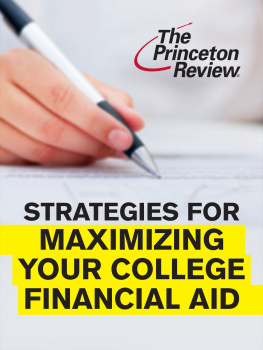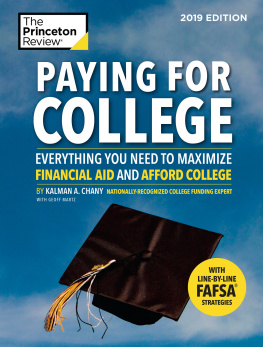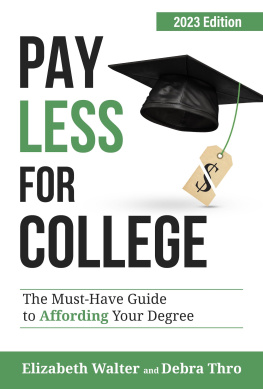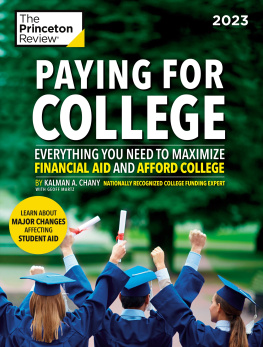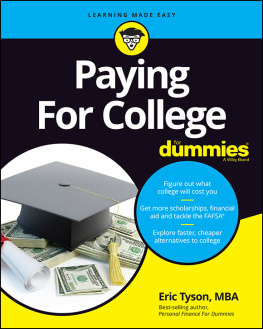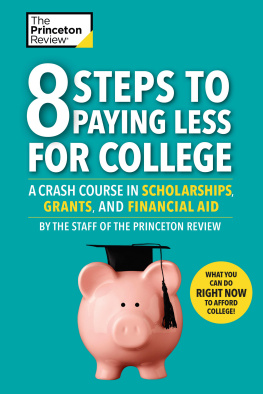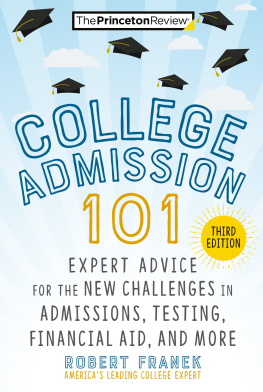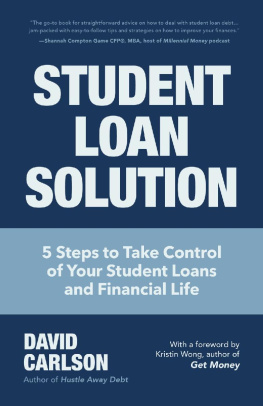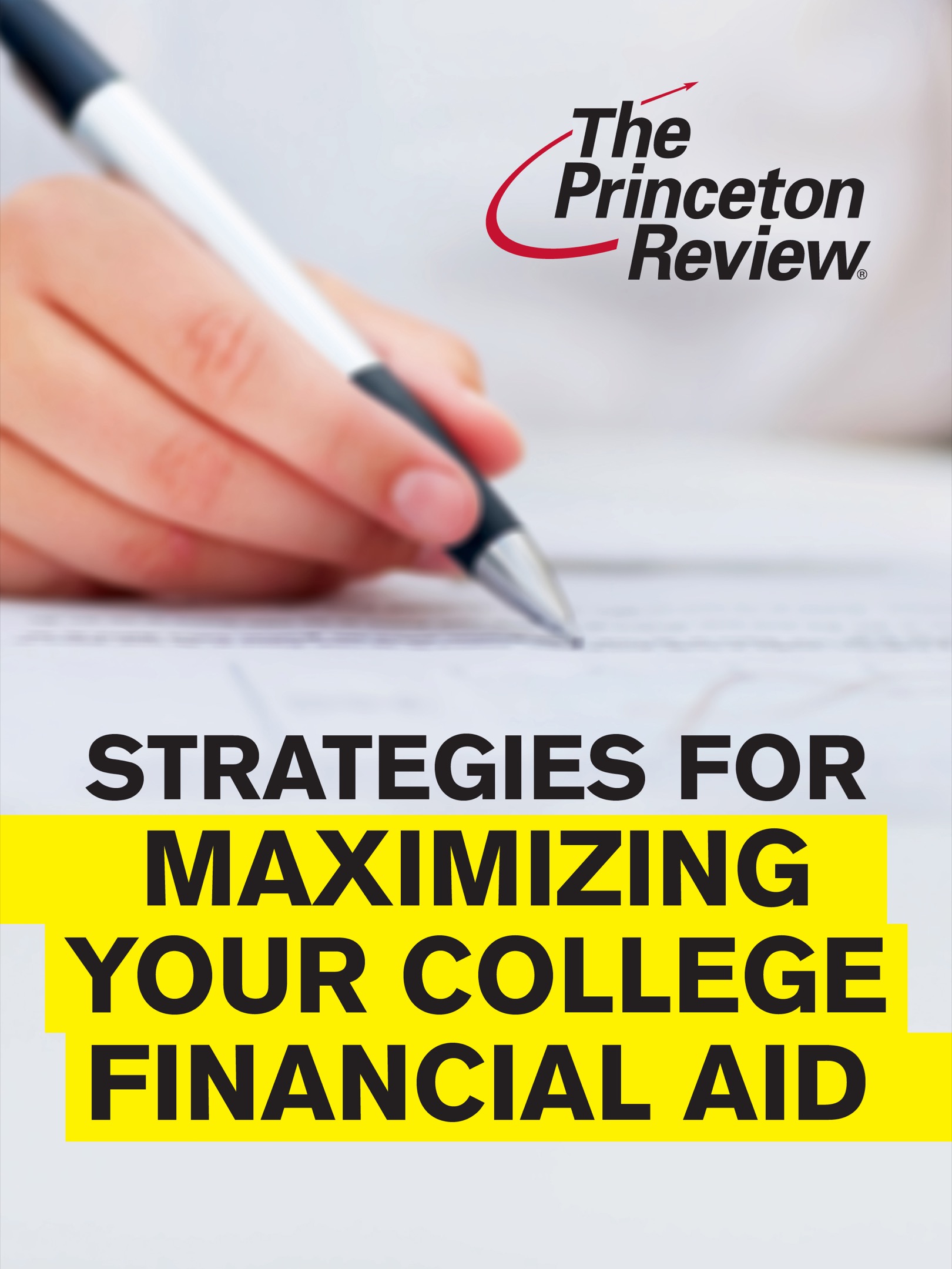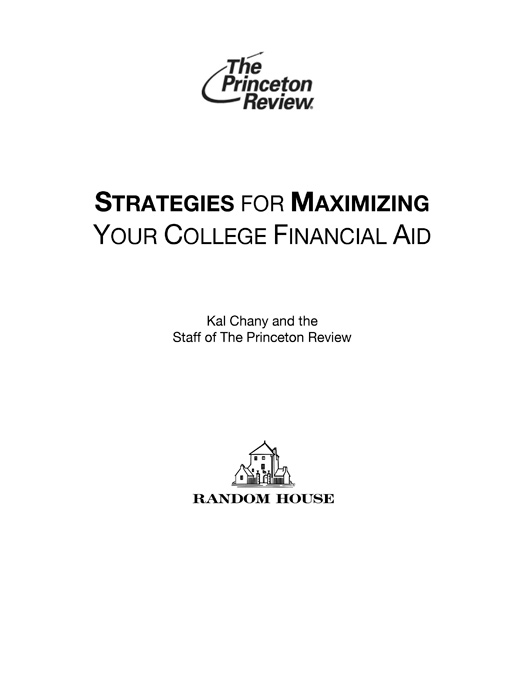Contents
Landmarks
The Princeton Review, Inc.
111 Speen Street, Suite 550
Framingham, MA 01701
E-mail:
Editorial
Rob Franek, VP Test Prep Books, Publisher
Laura Braswell, Senior Editor
Selena Coppock, Senior Editor
Meave Shelton, Editor
Calvin Cato, Editor
Random House Publishing Team
Tom Russell, Publisher
Nicole Benhabib, Publishing Director
Alison Stoltzfus, Managing Editor
Text copyright 2012 by The Princeton Review, Inc.
Cover copyright 2012 by Random House, Inc.
Front cover art INSADCO Photography/Alamy
All rights reserved. Published in the United States by the Princeton Review, an imprint of Random House, Inc., New York.
Portions of this ebook were previously published in, or adopted from, Paying for College Without Going Broke, 2012 Edition , published in 2011 The Princeton Review.
Visit us on the Web! www.randomhouse.com/princetonreview
Ebook ISBN 9780307944962
A Princeton Review E-Only Ebook
Random House supports the First Amendment and celebrates the right to read.
1. I NTRODUCTION
Paying for college is difficult for everyone these days. In addition to worrying about coming up with the cash, you also have to deal with a completely unfamiliar process. You will face decisions, deadlines, and application requirements that can sometimes seem scarily complicated. For parents of a potential college student, the amount of new information to absorb, fees to pay, and forms to submit can be overwhelming. And thats just for the admissionsprocess. If you are applying for financial aid (as you should be), there is another set of requirements that need to be met.
Nowadays, the problem is not so much how to get into college, but how to pay for it once you are there. The cost of a four-year private college education has passed the $150,000 mark at many schools, which is enough to cause even the most affluent parent to want to sit down and cry. Many of the public Iviesstate schools with excellent reputationshave been raising their tuition even faster than most private colleges. This year, an out-of-state student will haveto pay more than $45,000 to attend the University of Michigan for one year. Meanwhile, reduced university endowments caused by the stock market slump in 2008 and 2009 and cuts to the education budgets by state governments have combined to create a crisis in higher education. Some colleges have had to slash their budgets, lay off professors, and even consolidate with other schools. And even when you factor in the new educational tax benefits, securing financial aid has becomemuch more competitive as rising tuition and high unemployment have forced more and more families to apply for assistance.
If there is a bright side to all this it is that in spite of all the bad news, there is still a great deal of financial aid availableand we are talking billions of dollars. At these prices, almost every family now qualifies for some form of assistance. Many parents dont believe that a family that makes more than $100,000 a year, owns their own home, and holds substantial assets could possibly receive financial aid. These days, thatfamilyprovided it is presented in the right lightalmost certainly does. Many parents who make $50,000, rent their home, and have no assets dont believe they can afford to send their child to any type of college at all. They almost certainly canin fact, they may find to their surprise that with the financial aid packages that some schools can put together for them, it may cost less to attend an expensive private school than it would to go to a far less pricey stateschool. You might think that the families who receive the most financial aid would be the families with the most need. In fact, this is not necessarily true. The people who receive the most aid are the people who best understand the aid process.
Whether you know it or not, youve been contributing to financial aid funds for years. Each April 15, you pay federal taxes, a piece of which goes straight to the federal student aid programs. You pay state taxes, a part of which goes directly to state schools and a part of which funds state financial aid programs for residents of that state. You may even make contributions to the alumni fund-raising campaign at your own college. Your son or daughter may not goto your alma mater, may not attend a school in your state, may not even go to college, but you have paid all these years so that someones son or daughter can get a college education. You may now have need of these funds, and you should not be embarrassed to ask for them.
Weve found that the most successful way to approach all this is to plan ahead; for regardless of your situation; time is your greatest asset.
In this collaborative planning process, parents and children serve as reality checks for each other. It is important that parents and students communicate with each other early on so there are no misunderstandings. For parents: Will you be paying for everything, or will your child carry some of the burden? While you dont need to go into the minute details of your finances with your child, it is still a good idea to tell your child what you can really affordbefore he or she applies for admission to a particular school or set of schools. As a parent, are you interested only with schools with very high admission standards? It might be a good idea to work together to select at least a few colleges with a high acceptance rate where your students standardized test scores and GPA are above the average for the typically admitted student. You may also come to realize that you and your child can have differing expectations aboutcollege. You might want your son to attend school near home, while he actually wants to go to school three states away. Your daughter may want to major in literature, while youve always thought she would be better suited becoming an engineer. Although you may suspect that you know best, please remember the daunting challenge and peer pressure that this period of time can present to your child as a young person on the brink of adulthood.
Many parents traditionally view their familys financial information as highly personal and perceive questions asked in financial aid applications as invasive, and more plainly, none of the schools business. As parents, you should be very proud of your efforts to provide for your family. That pride, however, may often result in your being either hesitant to apply for financial aid or misrepresenting your familys information when applying. Neither is helpful toyour familys objective: ensuring that your child is financially able to attend a school of his or her choice. Therefore, you dont want to overstate the value of your income and asset information on the forms. The purpose of these questions is to determine the accurate level of financial aid that may be available to your child. Any overstatement of your wealth or education may prevent your child from being offered the level of financial aid they are qualified to receive andmay require in order to attend college. On the other hand, it is never a good idea to exaggerate your familys need. Colleges have sophisticated procedures to verify information in order to ensure that need-based financial aid funds are awarded in a fair and consistent manner.
Despite the complexity of the aid process, it is very important that you accurately represent your financial information on the aid forms. But it is equally important that you always remember that financial aid funds do not necessarily go to those who appear to be the neediest. Instead, the aid funds flow to those who best understand how the aid process works and to those who know how to present their situation to best advantage while still following the letterof the law.

